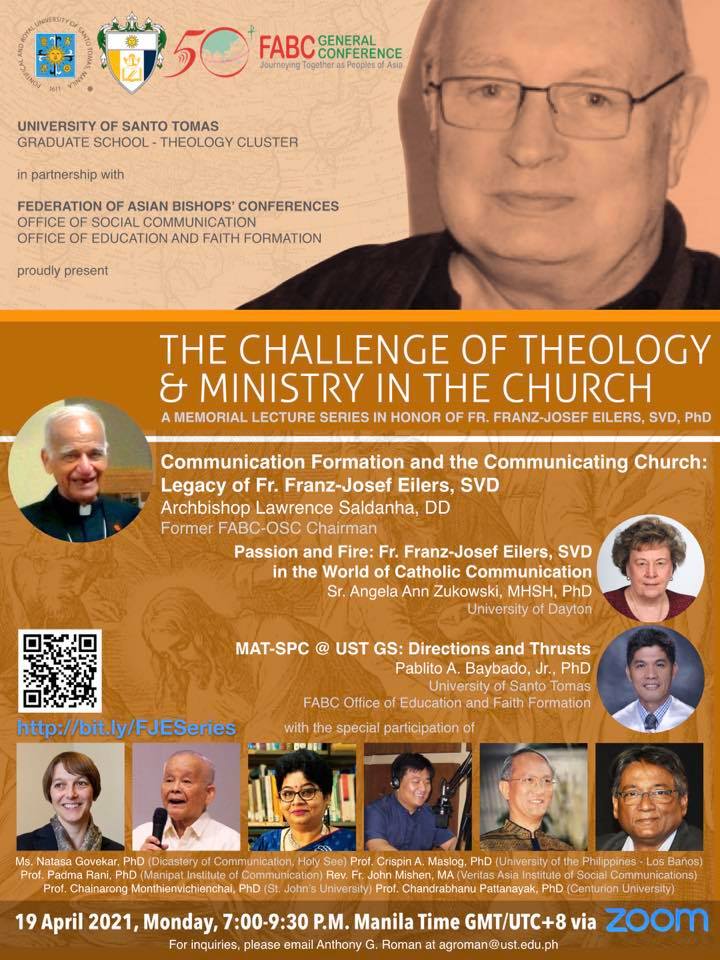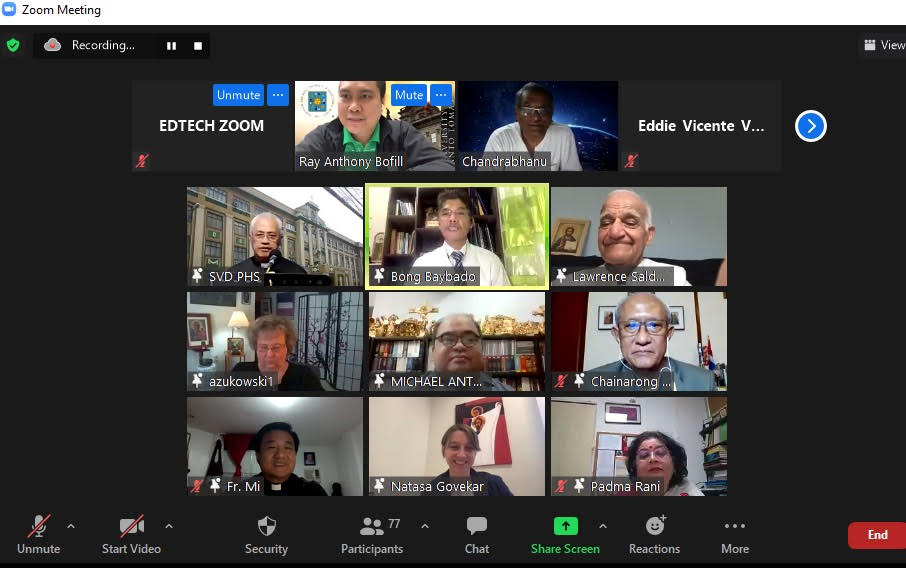With the theme, “The Challenge of Theology and Ministry in the Church,” the UST Graduate School Theology Cluster, in partnership with the Federation of Asian Bishops’ Conferences Offices of Social Communication (FABC-OSC) and Education and Faith Formation (FABC-OEFF), spearheaded the First Memorial Lecture Series in honor of Reverend Father Franz-Josef Eilers, SVD, Ph.D. (1932-2021). The webinar was held on April 19, 2021.
Almost 100 esteemed theological experts, pioneers, stalwarts in communication ministry, friends, and associates worldwide gathered virtually through Zoom to render a fitting tribute to Fr. Eilers, to celebrate his life, ministry, and legacy in the field of Social and Pastoral Communication Ministry.
The first in the series of Memorial Lectures, the webinar was graced by the Theological-Pastoral Communication of the Holy See Dicastery for Communication Director Professor Dr. Nataša Govekar. In her special message, she recalled when she was with Fr. Eilers in Manila a few years back. Showing the books of Fr. Eilers personally given to her, she quipped that books of the wise people are like relics, for in these books, we keep in touch with their wisdom of life and fill the gap that separates us from them.
Emphasizing that communication has its roots in the communion of the Three Holy Divine Persons, Govekar pointed out that this model is oriented towards communion among us, human beings, created in the image of God who is communion.
Govekar mentioned that Fr. Eilers’ whole life – his lectures, writings, consultancy works, and spiritual accompanying – were rooted in and oriented towards communion. This powerful communication tool, considered the icon of icons, has led to him to explaining the important distinction between Theology of Communication, Communicative Theology, and Communication Theology where communication is recognized as the basic principle and essential dimension of theology. Indeed, one cannot understand anything about God without communication. “Theology then is not something that we only can do with our “heads” but involves our whole being – our senses, our gestures, our inner attitude, our mind, heart, and hands,” Govekar noted.
One of the keynote speakers was Most Reverend Lawrence Saldanha, DD, Archbishop-Emeritus of Lahore, Pakistan, and former chairman of FABC-OSC, where Fr. Eilers worked as Executive Secretary. In his address, he pointed on the legacy of Fr. Eilers on Communication Formation and the Communicating Church. As a close associate, he considers the late priest a great visionary who touched the lives of thousands in his long life of service and sees him as German by birth and temperament but Asian at heart for his achievements in Social Communication, especially in the Asian continent. “He (Eilers) devoted his whole life to a study of Christian communication and its implications for the Church in Asia,” Archbishop Saldanha pointed out.
The Archbishop thanked Fr. Eilers for his constant efforts in making the Bishops aware of the growing impact of social media. Another contribution he emphasized was the effort of Fr. Eilers in media awareness education especially in the field of Radio, which has a daily broadcast on short wave in 16 languages. He sees the books of Fr. Eilers as inspiration and motivation to get a deeper understanding of the implications of social media and communication in general.
Archbishop Saldanha particularly highlighted the vision of Fr. Eilers in establishing centers for documentation and ongoing research in Asia such as the Asian Research Center in Bangkok and the Social-Pastoral Communication Program in UST, Manila.
Another keynote speaker, Sister Dr. Angela Anne Zukowski, mentioned Fr. Eiler’s vision and contributions to Social Communication. According to her, the late priest “understood, embraced and championed a vision for the Catholic Church’s Social Communication initiatives with breadth and depth.”
Sister Angela also mentioned the contribution of Fr. Eilers in the development of the Catholic Media Council (CAMECO) as its founding father “for the promotion of the world of the Catholic Church in the field of Social Communications in developing countries, through advice, planning, assistance in education and further studies” (CAMECO Statutes).
Meanwhile, UST faculty member Assoc. Prof. Pablito Baybado Jr., Ph.D., shared how his two mentors, Fr. Vicente Cajilig, O.P., and Fr. Franz-Josef Eilers, S.V.D., collaborated to establish the MA in Theology major in Social Pastoral Communication (MAT-SPC) program at the UST Graduate School in 2001 which eventually became an ecclesiastical/ licentiate program of the UST Faculty Sacred Theology beginning in 2008. As head of the Theology Cluster and one of the webinar organizers, Baybado shared that Communication Theology is not skills-oriented but seeks to form and inform personal disposition for proper communication ministry that begins with interpersonal communication.
Talking about the thrust and direction of the program, Baybado shared that its emphases are on communication dimensions of Church ministries, evangelizing communication, intercultural communication, communication dimension of inter-religious dialogue, discourses, research, publication, and training in partnership with the Asian Research Center based in St. John University in Bangkok.
Baybado explained that this program seeks to capacitate competent Church communicators who have deeper knowledge and theologically grounded with enhanced practical skills and are research-oriented, be at the continuing service for the Church in Asia with more than 60 graduates, be able to respond to the needs of the times and to expand the network. “We need to revitalize the partnership and cooperation with all of you so we can ensure the improvement, the continuity, and the sustainability of the course,” he stressed.
There were testimonies from friends of Fr. Eilers, such as Prof. Dr. Padma Rani of Manipal Institute of Communication, India, and Asian Research Center, Bangkok, Thailand. She recounted Fr. Eilers’ accomplishments as Founder of Communicatio Socialis, the academic journal in Germany still existing until today, the founding of Catholic Media Council (CAMECO) in Germany, the founding of Religion and Social Communication Journal published in St. John University that focuses on interfaith communication in the Asian context.
The other testimonies were given by Prof. Chainaron Monthienvichinechai, Ph.D., Chancellor of Saint John University in Bangkok and co-founder of the Asian Research Center (ARC), Prof. Chandrabhanu Pattanayak of Centurion University of Technology and Management, India and ARC, and Fr. John Mi Shen, a professor of the MAT-SPC Program in UST.
Fr. John shared that Fr. Eilers, in 2018, instructed him to bring the tabernacle, which was made in Germany, to China. Delving on the word “munis” which means “gift,” he shared how Fr. Eilers became a gift to him in his life and how he became influential in his life. In his last moments with Fr. Eilers in the hospital, hours before his death, he was told to “go and finish your dissertation.”
UST Graduate School Dean Prof. Michael Anthony Vasco, PhD., expressed his happiness to have worked with Fr. Eilers especially in establishing the Program 20 years ago. Thanking everyone present, the dean said that the MAT-SPC program is the legacy of Fr. Eilers, and he will always be remembered for this contribution to the Holy Church.
The webinar concluded with a moment of silence in prayer for the repose of the soul of Father FranzJosef Eilers, SVD, Ph.D. The second part of the continuing series will be held on May 11, 2021, with Bishop Paul Tighe and Cardinal Gracias as speakers via Zoom, to commemorate Fr. Eiler’s birthday, who was born in Germany on May 11, 1932, and died at the UST Hospital on January 13, 2021. He was 88 years old.






